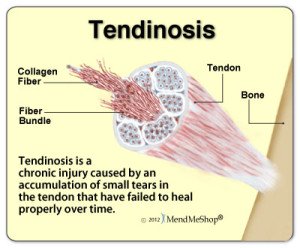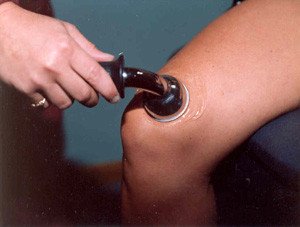nalco group
bone, muscle & joint pain physio
BOOK NOW / WHATSAPP ABOUT YOUR PAIN OR INJURY
- NOVENA 10 Sinaran Drive, Novena Medical Center #10-09, Singapore 307506
- TAMPINES 9 Tampines Grande #01-20 Singapore 528735
- SERANGOON 265 Serangoon Central Drive #04-269 Singapore 550265
Home > Blog > Physiotherapy & Hand Therapy > Tendinosis Physiotherapy
Tendinosis Physiotherapy

Image by MendMeShop
Tendinosis is usually referred to chronic or long term tendonitis, and it occurs mainly due to constant, repetitive cellular damage to a tendon. This causes a slow and consistent damage and degeneration without any inflammation (this means that tendinosis happens gradually without little to no swelling).
Our tendinosis physiotherapy patients often report of a stubborn annoying pain, but don't experience any signs of swelling. Just that a particular spot/location is sore and tender.
Unfortunately, some of our patients come to us with partial or fully ruptured (100% torn) tendons, as the damage and degeneration had progressed so much over time that the tendon's integrity was very weaked and compromised, and that caused their weakened tendon to snap with little force and movement.
For patients with mild to severe tendinosis without any ruptures, we need immediately protect the injured and weakened tendon and prevent any further injuries or aggravation. We may get a customized splinting done over the tendon and joint eg resting foot splint for ankle and foot for the chronic achilles tendonitis patient.
Of course, we can tape as well, but for daily use, we prefer customized splinting as splinting can be less abrasive compared to using rigid/sports tape. Read on rigid taping here.
For patients who have ruptured tendons, these ruptured tendons will definitely require surgical interventions to bind the ends of the tendon together, and then managed with post-surgery physiotherapy and hand therapy.
Diagnosing Tendinosis
For patients with a tendon micro-tears or partial ruptures, our senior physiotherapists and hand therapists can determine it upon assessment by
- observing how the joint looks statically and dynamically
- observing how the joint moves
- palpating and moving the joint
Doctors may order MRI (magnetic resonance imagine) or ultrasonography to confirm tendinosis.
Most patients with tendinosis will present with
- joint stiffness
- aching
- pains
- discomfort
- muscle weakness
Sometimes there is presence of swelling, but most of the time, no. What is constant though, is that patients report pain, swelling and stiffness after activities.
Another thing we note is that quite a few of patients with tendinosis reports that they noticed these symptoms during a busy or stressful season of their lives. This makes sense because when we are stressed/busy, we tend to contract our muscles more, and this places a constant strain and drag on the tendons.
If patients decide to destress with sports and exercises, this continues the muscle pulling and strain on the tendons, and causes/aggravates tendinitis and tendinosis.
This is one of the reasons why we recommend regular deep tissue release therapy for all our patients, to ensure that overly-used or tightened muscles be treated to become optimal length and helps us move better and with less injuries.
Physiotherapy Treatment of Tendinosis

Tendons tend to heal slowly and injuries to tendons can recur easily due to their nature. Tendons do not have any direct vascularity (no direct blood vessels to supply them nutrition, unlike red and blood-rich muscles).
Tendons on the other hand, receive nutrients through
the tendon sheaths. To make matters worst, if there is any injury or tears to the tendon, our body will generally repair them with disorganized collagen fibers, creating a weaker-than-normal tendon...plus tendons are always involved in any sorts of
movements, increasing their risk for injuries and reinjuries.
That's why tendon injuries take longer time to recover (and why we generally are more protective/conservative in managing tendon injuries).
Our medical professional colleagues often prescribe NSAIDs (non-steroidal anti-inflammatory drugs), and following diagnosis, our senior physiotherapist will then create a custom physio intervention plan for you, and depending on the causes of the problem, you may be treated with a combination
- heat therapy to loosen the muscles, tissues and joints
- cold therapy to decrease inflammation and pain
- ultrasound therapy to accelerate soft tissue healing
- manual therapy
- joint manipulation and mobilization to increase the natural range
- pain relief physiotherapy
- stretching and flexibility physiotherapy
- dry needling physiotherapy
- computerized decompressive spinal traction
- progressive strengthening
- core stability strengthening
For mild tendinosis cases, patients usually take about 3-7 days for the acute symptoms to be relieved, and full recovery takes about 2-3 months. But of course, this varies from individual to individual (some individuals recover pretty fast, some take longer than the usual).
Other patients share this following advice, as advised by family, friends and their own doctors.
- Consumption of Vitamin B6
- Muscle Eccentric Loading
- Using Inflatable Splints
- Shock-wave therapy
- Tendon Bioengineering
- Consumption of Vitamin E
- Consumption of Nitric oxide
